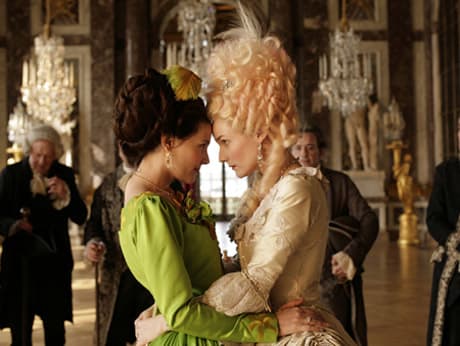Contained almost entirely within Louis XVI's royal court over four days leading up to the French Revolution, Benoît Jacquot's Farewell, My Queen takes a sudsy, frenzied and even Sapphic look at female power dynamics and methods of control. This operative "look" even tells a story of its own, defined both by perspective within the text of the film as well as the nature of historical legacy and active viewership as defined by the male eye.
Here, acting as a microcosm for more socially substantial and recognizable conflicts, is Sidonie (Léa Seydoux), the Queen's reader, whose identity is defined only by her actions and unwavering loyalty to the flighty layabout, Marie Antoinette (Diane Kruger). Spending her days catering to the whims of her Queen, her exchanges with other servants and Bastille staff tend towards single-minded information gathering and subtle coercion for opportunity to get closer to, and learn the secrets of, her royal object of desire. This leads to the titillating revelation that the Queen's intense friendship with her Duchess, Gabrielle de Polignac (Virginie Ledoyen), might have physical implications.
Following Sidonie through shadowy candlelit hallways from the cell-like living quarters of servants to opulent royal environments, the frantic energy of impending chaos is made dreamlike by frequent banality and unwarranted calm. The anarchic sensibilities of nighttime, defined by plans of escape and anxious acknowledgements of impending beheadings, are juxtaposed with the deluded calm of day when Sidonie reads Rousseau to her majesty and quietly manipulates situations with the hopes of replacing Gabrielle.
But just as our perspective is limited to that of the subjugated, an outside eye desperate to obtain control or power, the greater vision of the action is primarily male. While Sidonie's struggle clearly mirrors that of the commoners trying to overthrow the Bastille, our gaze at these historical acts perceives these women as fetish objects, lingering on heaving cleavage and making sexual the bond between the Queen and her Duchess. Just as the will to power isn't entirely altruistic – even when starting the French Revolution – our own concept of the past is defined by male signifiers, even in a story about the subtle tug-of-war between women using kindness and flirtation to manipulate and control a situation.
Even though we know the Queen loses her head, both figuratively and literally within the text of this film, leaving commoners like Sidonie the victor, there's an overriding sense that her escape and equality shape less of an identity than the potential and desire for absolute power.
(eOne)Here, acting as a microcosm for more socially substantial and recognizable conflicts, is Sidonie (Léa Seydoux), the Queen's reader, whose identity is defined only by her actions and unwavering loyalty to the flighty layabout, Marie Antoinette (Diane Kruger). Spending her days catering to the whims of her Queen, her exchanges with other servants and Bastille staff tend towards single-minded information gathering and subtle coercion for opportunity to get closer to, and learn the secrets of, her royal object of desire. This leads to the titillating revelation that the Queen's intense friendship with her Duchess, Gabrielle de Polignac (Virginie Ledoyen), might have physical implications.
Following Sidonie through shadowy candlelit hallways from the cell-like living quarters of servants to opulent royal environments, the frantic energy of impending chaos is made dreamlike by frequent banality and unwarranted calm. The anarchic sensibilities of nighttime, defined by plans of escape and anxious acknowledgements of impending beheadings, are juxtaposed with the deluded calm of day when Sidonie reads Rousseau to her majesty and quietly manipulates situations with the hopes of replacing Gabrielle.
But just as our perspective is limited to that of the subjugated, an outside eye desperate to obtain control or power, the greater vision of the action is primarily male. While Sidonie's struggle clearly mirrors that of the commoners trying to overthrow the Bastille, our gaze at these historical acts perceives these women as fetish objects, lingering on heaving cleavage and making sexual the bond between the Queen and her Duchess. Just as the will to power isn't entirely altruistic – even when starting the French Revolution – our own concept of the past is defined by male signifiers, even in a story about the subtle tug-of-war between women using kindness and flirtation to manipulate and control a situation.
Even though we know the Queen loses her head, both figuratively and literally within the text of this film, leaving commoners like Sidonie the victor, there's an overriding sense that her escape and equality shape less of an identity than the potential and desire for absolute power.
